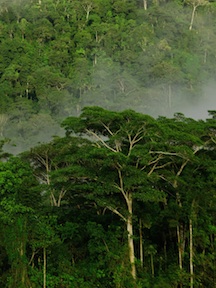By Samantha Yates
Creating programs that bring together different disciplines is the challenge and the reward of a liberal arts education. One such program at McDaniel College is The Forest Online, a collaboration between the Environmental Science and English departments to create a series of classes in which students learn about conservation, sustainability, and research to put into practice during a January Term trip to Peru.
Students are divided into teams, conduct research based on their team’s objectives, and then blog about their research and experience on the class website. The course aims to broaden students’ perspectives, help them to see that this incredibly biodiverse part of the planet should be protected, and empower them with the tools to tell important stories that inspire conservation. While the core of the program is storytelling, students learn key skills in research, multimodal projects, and journalism.
And perhaps the best part is the actual hands-on experience and real-time results that reinforce the interdisciplinary studies. Josh Ambrose, the English professor and instructor for the class, believes that “one of best ways to help people actualize liberal arts is to go and do things and experience something: interacting with others, writing for grants, etc. We want students to realize the agency that they have, that they have the ability to effect change in their own lives and the lives of others.”
It is a trend in the liberal arts to use experiential learning to help reinforce the cross-disciplinary studies that students pursue in higher education. George Kuh of Illinois University and Director of the National Institute for Learning Outcomes Assessment has researched and identified High Impact Educational Practices, which include collaborative assignments, service learning, internship experiences, diversity and cultural experiences, and research opportunities, all of which help tie together lessons from different disciplines and are present in the Forest Online class.
These practices are not unique to McDaniel College, of course. A Study in the Best Practices of Experiential Learning at Liberal Arts Institutions named such schools as Guilford, Whitman, Wellesley, and Lafayette Colleges as similarly achieving high marks in experiential learning. The University of Mississippi has a program called Study USA. These winter session courses offer an immersive interdisciplinary experience where “students learn in two weeks is more than I could ever teach them in a classroom for a whole semester,” said Neil Manson, UM professor of one Study USA course. The kinds of programs and the desired learning outcomes of each differ, but the idea is the same—experience is vital to reinforcing a liberal arts education.
These are just some of the programs around the country that are working to embody the liberal arts through immersion experiences. For The Forest Online class, it can be argued that the environmental research might not mean as much without first understanding the stories of the people and the place in which students are conducting research. The storytelling that emerges from the study of an incredibly biodiverse area also might not be as well understood or believed without the backing of research and cold, hard facts. The world we live in needs a blend of information, scientific research with the appeal to human experience. It’s courses like The Forest Online that manage to capture this way of understanding and conveying information, and, overall, allow students to make the most of their liberal arts experience.
Samantha Yates is a junior at McDaniel College majoring in English and minoring in economics. McDaniel College is home to the Delta of Maryland Chapter of Phi Beta Kappa.




